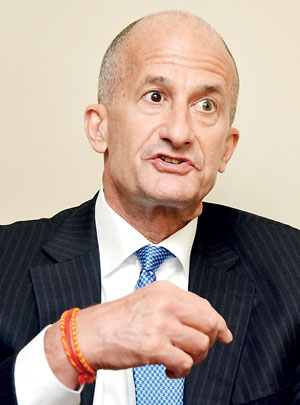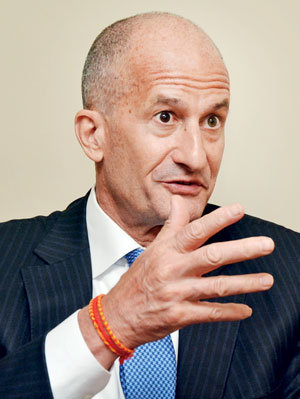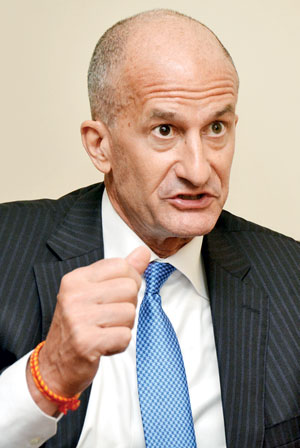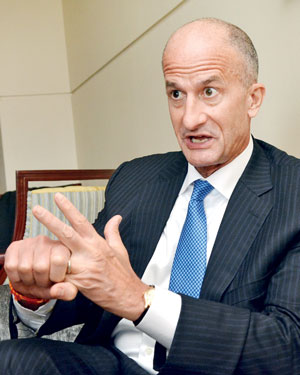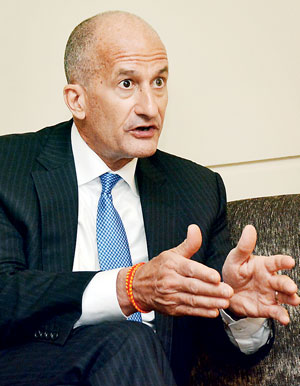Tuesday Feb 24, 2026
Tuesday Feb 24, 2026
Thursday, 20 July 2017 00:00 - - {{hitsCtrl.values.hits}}
Global multination General Electric (GE) is implementing its slogan ‘Imagination at Work’ in Sri Lanka searching for new investment opportunities and engagement with the Government including pushing for the finalising of a dragging locomotive deal as well as wider investment in healthcare and the power sector. GE Vice Chairman John Rice talked to Daily FT on the company’s ambitions in Sri Lanka and what the country needs to put in place to kick start lagging FDI numbers. Given below are excerpts of the interview:
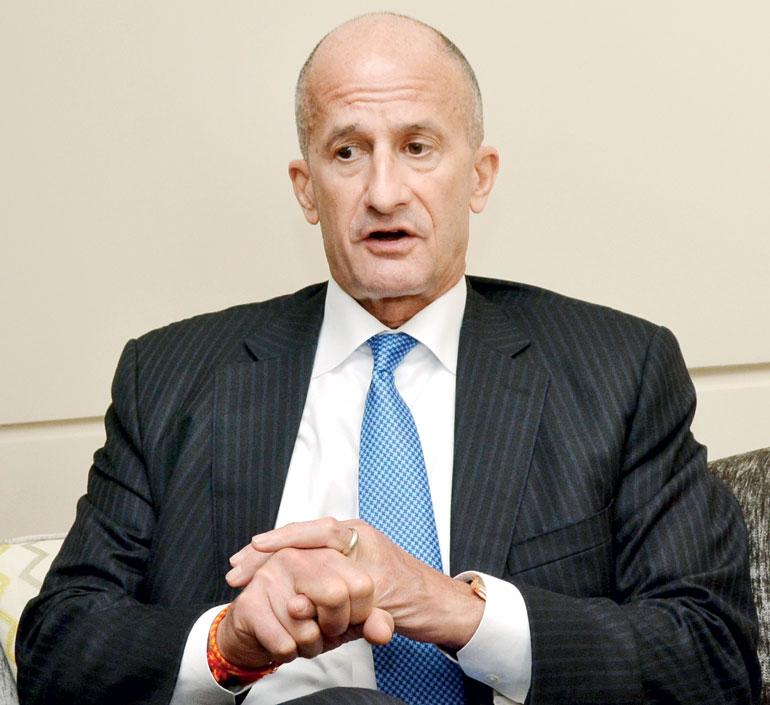
By Uditha Jayasinghe
Q: What are your company’s plans for Sri Lanka? How would they like to engage more with the Government?
A: We have a good reputation here. We are as a company known for our openness and transparency when it comes to business practices. We certainly want to be. I think that fits hand in glove with the goals and agenda of the Government. We discussed several projects including separate financing for equipment that would improve the capabilities for diagnostic imaging and radiology for cancer treatment. Our proposal is to prove this case with three hospitals in the Colombo area and then expand it. The Government would pay on a fee per scan basis and the cost would be based on today’s cost so they would get a significant upgrade in equipment, the ability to treat more patients in a better way and cost per patient would be what they see today. So we think it’s a very attractive proposal for a Government that wants to do more for the citizens of Sri Lanka in the healthcare space. Budgets are tight and we understand that there is limited space to fund big capital equipment purchases so we think we have solved two important requirements. We think the advantage of this proposal is that the Government ends up paying for the services that are required. We are on the hook for ensuring the equipment operates properly and remains available to serve as many people as possible. The incentive for us is to keep the equipment operational so that as many patients as possible can be scanned.
Q: GE already has significant presence in Sri Lanka’s power sector, particularly thermal energy. How could this be developed as the country focuses more on renewables?
A: We think our capabilities are proven. There are active tenders underway for traditional power projects. We are participating in them and we believe the best technology will be chosen. It is important in all these infrastructure projects for the Government to demonstrate that it’s prepared to move forward. We are also bidding on a locomotive tender that has been underway for various parts over the last eight years. We think the conclusion is clear, we think the results demonstrate that our technology is the best technology and we think it’s important for the Government to draw this to a conclusion.
The goal of the Government is to attract more FDI. We are prepared to invest. We think that the signal to us as an investor and to other companies that will invest come from openness, transparency, and a clear path to decision making and when projects stumble along or get revisited two or three times or take many more years than they should then investors lose interest and go other places. We certainly don’t want to see that happen here and we would like for the work that we do in Sri Lanka to be a signal to other companies that this country is open for business.
Q: You said that GE is interested in more tenders in the power sector. Could you share more information?
A: We operate across all forms of power generation. One of the things this country needs is a way to respond quickly if the rainy season doesn’t provide the amount of water necessary to run the hydro facilities at full capacity; there has to be some compensating mechanism. Today that happens in large part through diesel power generation, which is expensive and not necessarily the best from an environmental perspective. We think there are best options using LNG or LPG with aeroderivative technology that can be moved around. So if droughts are in one section of the country in one year and the next year they are in a different section then these power units can be moved around because they are on trailers. So this is another example of type of technology that is available and we are talking about to the Government and potential partners.
We are prepared to invest. We think that the signal to us as an investor and to other companies that will invest come from openness, transparency, and a clear path to decision making
The level of employment is typical linked with our commercial activity. So as we achieve more commercial success how much of that work has to be done locally has to be considered
One important message is, have a time frame and stick to it and make a decision. In a big complicated tender it is always possible to pick one line or one part, which someone can object to. However at some point the Government has to say enough. I think certainly in terms of the rail deal the time for that is now
Q: Why is GE looking at Sri Lanka now?
A: We believe the Government wants to operate openly and transparently. We think that this Government is genuinely interested in providing basic infrastructure for its citizens. It’s hard to sustain economic growth if you don’t have adequate sources of electricity and basic healthcare for all. There are basic building blocks that need to sustain growth and for the citizens of a country to feel that they are participating in this growth. We think this Government is committed to this aspiration and we believe there are a number of areas where we can be a contributor.
Q: For GE to have a larger footprint in Sri Lanka it would need to have a physical presence here. Are you considering expanding operations here? Who are the partners you are talking to?
A: The level of employment is typical linked with our commercial activity. So as we achieve more commercial success how much of that work has to be done locally has to be considered. In the healthcare situation the people operating the equipment will not necessarily be GE employees but they will be trained by us. Beyond specific GE jobs we also plan to build capacity, train and develop people in all of the segments we are active in. Ultimately in healthcare what we are discussing with the Government is an even broader package that would be available to people who don’t necessarily operate our equipment but need to be skilled in different forms of medical technology.
Q: You touched upon the fact that it is sometimes difficult to do business in Sri Lanka and this is borne out by our FDI numbers. What are your three top policy priorities to attract investment?
A: Openness and transparency we have already talked about. I think what is separate but related is a distinct decision making pathway. If I take the rail project as an example it has been underway for eight years. We are talking about only 12 locomotives. The country needs more locomotives, I don’t think anyone disputes that, and at some point you have to make a decision and move on. I think having a clear path to decision making is very important to investors. GE operates in 180 countries. We have to go where the opportunities are and where we can see a path to getting something done.
We don’t want to short-circuit the process, we believe completely in ethical and transparent business practices. But, if you look at the rail deal as an example, it has been very complicated and the path to a decision has not always been clear. So one important message is, have a time frame and stick to it and make a decision. In a big complicated tender it is always possible to pick one line or one part, which someone can object to.
However, you shouldn’t be able to object to technical specifications and price but there are all sorts of other factors that go into it, and it is very easy for people who have their own interests at stake to pick it apart. At some point the Government has to say, “No, we’ve gone far enough. This is a bonafide good proposal and we have to live with that result.” I think certainly in terms of the rail deal the time for that is now. Making the sort of commitments that will facilitate the financing that these projects need including watertight agreements.
We believe new technology will allow for a substantial reduction in tariffs and the final analysis will be very attract for the Government and to the citizens that have to ultimately pay the bill. The kind of commitments that will facilitate this managed equipment services in healthcare, if you are willing to say “we will commit to give you so much for each scan or use of equipment,” then it’s easier for investors like us to line up and say “well now we can understand how this will work” and we can make an investment and get a reasonable but not exorbitant return on that investment. That is what FDI requires.
Q: You highlighted financing needs but as Sri Lanka is in a period of fiscal consolidation this may be a challenge. Do you view this as a stumbling block?
A: I view it as a challenge but not a stumbling block. There are export credit agencies that are willing to work with us. In a country like Sri Lanka we have a line of sight for financing for all three of the projects that we have discussed and in one case it is confirmed and in the power case it is well on the way to being confirmed and in healthcare we are going to take responsibility for the financing. So it’s complicated and a challenge but when you do business around the world the way we do it is not a complication we are afraid of.
Q: How can Sri Lanka leverage itself to attract more investment?
A: Most investors are not going to necessarily come here because of the size of the market. But they will come here if they think they can get something done. People will come here because you can get projects done. Some countries rely on the size of the market but that does not mean Sri Lanka has to always be in the shadows. The fact is that is if you can get things done here, which is why I think completing the locomotive project is important for us and other investors to say “Yup! We can get something done”. It’s the same thing with power and potentially the same with healthcare.
Most investors are not going to necessarily come here because of the size of the market. But they will come here if they think they can get something done. People will come here because you can get projects done
If we did everything in all three areas it could be $50 million to $100 million but that would require us to succeed commercially in these areas and in many respects that would be just the beginning as each of those areas could require more investment in the coming years
Q: The Government has spent a lot of time on trade agreements. Do you feel this is an immediate need or do you think the points you highlighted for FDI should get priority?
A: I think you have to do both. In many respects we have moved in the past few years from multilateral world to a bilateral world and many of the countries that the Government is trying to forge trade agreements with are important for Sri Lanka. Frankly they are important for GE. When you do business in 180 countries you have to be bilateral and so we are very active in China, we work with Chinese partners on the Belt-Road Initiate and Sri Lanka is part of that. Five years ago no one was thinking about the Belt-Road initiative, it was introduced three years ago and now it is mainstream thinking. We aspire to be one of the best partners. So if it’s a bilateral relationship between Sri Lanka and China we can participate, we can help. If it’s a bilateral relationship between Sri Lanka and Singapore we can do the same because we are in these countries.
Q: GE acquired Shipexpress last year. What are your plans in this sector?
A: We are always looking at how we can grow in each of our sectors and that would be no different. The specific circumstances under which we would invest and grow are under development so I don’t have a specific answer for you now.
Q: Do you have expansion plans in Sri Lanka?
A: It’s tied to the work that we are doing. If we did everything in all three areas it could be $50 million to $100 million but that would require us to succeed commercially in these areas and in many respects that would be just the beginning as each of those areas could require more investment in the coming years.
Q: President Trump has called for American companies to invest more and create more jobs at home. But most of GE's revenue comes from outside the US. How would your company tackle this paradox?
A: We don’t think it's a paradox. We do not think investment or the job creation that it leads to is a zero sum game. The idea that creating a job in Sri Lanka, in India or China means one less job in some place else like the United States is just not a notion that we are familiar with. We think that if it’s done properly job creation is synergistic. You create jobs because you participate in global markets, support and create jobs in Western Europe or United States that would not have existed otherwise.
Some of the work that supports the locomotive tender will come from the United States, some of it may come from India, but you will have more work in a place like the US if we are successful with this project than you would have had otherwise. So either you get zero if lose the tender or you get some jobs. So our argument in the context of global trade is that you have to develop capabilities in lots of places in order to support markets and have access. That leads to the support and creation of jobs in other countries.
We don’t have a plan to move back more to the US. We think the US will always be an important market for us. We will always be developing capabilities, we have opened more than 10 manufacturing plants there in the last five years, but we have also opened facilities in India, in other parts of Asia. We look our manufacturing footprint as the world and then we try to decide where the best places to do things are, and where we can make use of local markets with capabilities that will allow us to perform better on a global scale.
Q: You met top Government officials during your visit here. What were your impressions?
A: I think we have the reputation of a company that the Government would like to support here. We certainly hope that we can move forward in the three areas I described before and make those visible signals that Sri Lanka is open for business and American companies can get things done in a responsible way and support an agenda that provides benefits for the people of this country. That is the important point. We believe each of our projects are in the best interest of the Government and the citizens of Sri Lanka.
